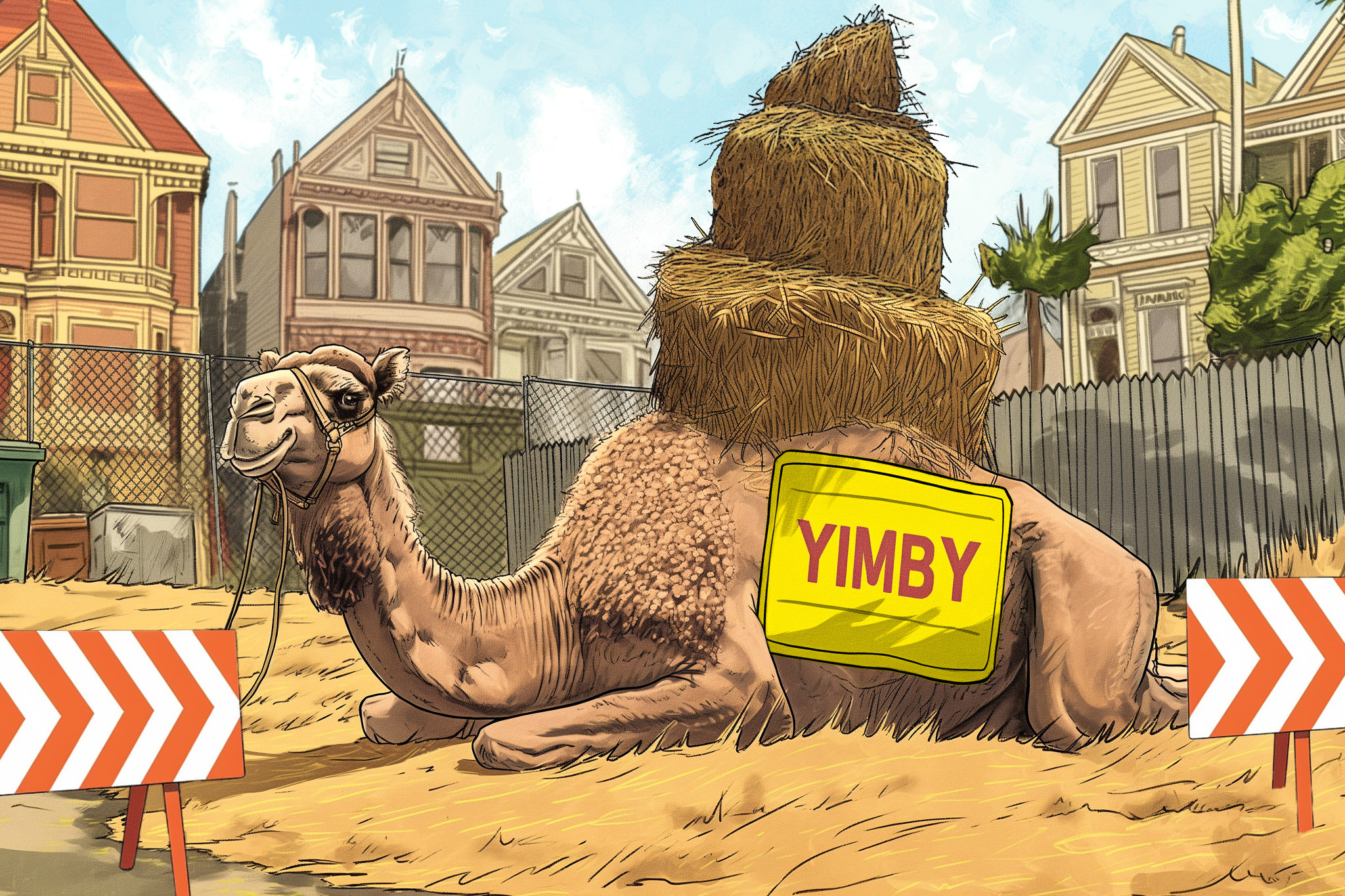You’ve got to hand it to Supervisor Aaron Peskin. He knows how to blow up a movement.
That’s just what he did with his latest move to limit residential development in and around the Jackson Square and Northern Waterfront districts. He dealt a calculated blow to the city's fragile, moderate, pro-housing coalition—widening the fracture between pro-housing centrists and radical elements of the YIMBY movement who want to build, build, build high-rises everywhere.
Everyone who wants more housing in San Francisco should pay heed because, like a camel's back, the coalition won't need much more straw to collapse.
We can't let that happen.
Although Peskin's bill blunts the effectiveness of state laws designed to allow more dense construction, he said, "This is not a policy discussion. This is a political discussion." I agree. It was an absolute triumph of politics over good governance. Here are six implications of this debacle for the future of housing in San Francisco.
San Francisco is still not serious about building housing
This is a red flag for both the state and, more importantly, the capital markets. Peskin's bill treats every parcel of land alike, from legitimate historic sites to blighted parking structures. Meanwhile, the city already has standards to deal with demolition and major alterations of buildings in historic districts. Supervisor Catherine Stefani is working on legislation to add nuance in addressing density decontrols and height bonuses in this area, but the damage has been done. The anti-growth message sent by the vote will further deter investment in the market, compounding the housing crisis.
Divisive politics threaten the moderate pro-housing coalition
The unexpected support for overturning Mayor London Breed's veto from Stefani and Supervisor Rafael Mandelman underscores the need for a more nuanced approach to the housing debate. While the YIMBY movement has been effective, the “all or nothing” attitude of its radical wing needs to be replaced with a more flexible stance to avoid alienating centrists. The emphasis on wedge issues, from letting the state impose blanket construction rules, pushing for seemingly unlimited building heights, eliminating single-family zoning, repealing Proposition 13 property tax limits, banning automobiles and trying to force zero parking on all projects, create unnecessary conflict and alienate would-be allies.
Overly aggressive state-level maneuvers have also backfired. After opposition from the majority of supervisors, Sen. Scott Wiener was forced to amend his bill that would have otherwise limited the California Coastal Commission’s oversight of San Francisco's neighborhoods—a misguided attempt to boost development.
Upzoning alone will not boost housing production
The true obstacles to new construction are a dysfunctional city permitting system, unnecessarily burdensome building codes and administrative policies born of decades of regressive legislation sponsored by anti-growth radicals, including Peskin and his allies.
San Francisco has already approved the construction of 68,632 housing units that will not get built without tangible reforms such as eliminating transfer taxes, further reducing impact and permit fees, property tax abatement, and streamlining planning approvals and permit issuance to less than six months. This is not sexy stuff. But our leaders should be engaged in this substantive work rather than headline-grabbing cheap shots and political grudge matches.
A blow to Breed
The vote effectively renders the mayor a lame duck in the eyes of many moderates. The votes of Stefani and Mandelman, once Breed allies, signal a profound shift in the city’s political alliances and Breed's diminished capacity to effectively govern for the rest of the year. The loss of political capital is not just a personal defeat for Breed but a stark reminder of the challenges of San Francisco politics. Moderates seeking election in November must appeal to a broader voter base and approach housing with more nuance, as Breed is seemingly now starting to do.
Moderates must unite around bigger-picture goals
Citizens should demand that candidates address the substantive issues facing our city: Creating clean and safe streets, reducing high business taxes, drug dealing, addressing mental health treatment and homelessness, and improving our public schools.
These are all prerequisites to attracting investment to San Francisco to build housing, and tackling them requires both a moderate mayor and a moderate majority on the Board of Supervisors.
Voters must reject the extreme hard-left ideology represented by people like Peskin and Supervisors Dean Preston, Connie Chan and Hillary Ronen, who have contributed to policies that hurt small businesses and blue-collar workers and led to thousands of layoffs.
Peskin could become mayor under ranked choice
Peskin's cynical campaign to preserve a handful of blocks in Jackson Square and the Northeastern Waterfront was a devious trifecta. He created a flashy distraction from the tangible issues underlying the housing crisis, built momentum for a mayoral run and ensured that nothing will block the views from his multimillion-dollar home.
Moderate candidates need to stop infighting and unite against Peskin. Citizens must understand how ranked choice voting works—a candidate with few initial votes could win if people don’t rank multiple additional candidates beyond their first choice.
This episode underscores the urgent need for new leadership and perspectives, and for extreme YIMBYs to shift their tone. If they don’t, the pendulum will swing back in favor of NIMBYs, and we won’t have a chance at the recovery required to stimulate housing development. We can’t allow Peskin and his allies to exploit this division.
Moderates’ messaging should be laser-focused on tangible, linchpin issues that will unlock housing production, with no antagonism and arrogance in the delivery. By building and maintaining a broad-based moderate coalition on housing development, we can avoid perpetuating a Doom Loop and accelerate a Boom Loop, ensuring a more prosperous future for all San Franciscans.
Cyrus Sanandaji is the founder and managing principal of Presidio Bay Ventures, a San Francisco-based real estate investment and development firm that recently completed the largest Home-SF project.
